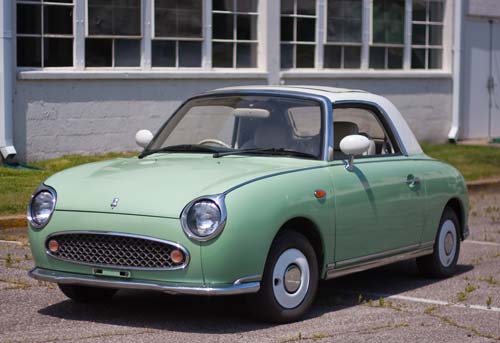
Nissan Figaro-1991
The Nissan Figaro was a limited-production, high visibility “halo” car, intended solely for the Japanese market. Based on existing Nissan Micra mechanicals, the “retro styling car” was intended to...
VEHICLE DEMONSTRATIONS EVERY SATURDAY & SUNDAY AT 11AM, FREE WITH ADMISSION!
Please note that the cars or exhibit items shown in this database are part of our collection but may not be on display when you visit.
The Nissan Figaro was a limited-production, high visibility “halo” car, intended solely for the Japanese market. Based on existing Nissan Micra mechanicals, the “retro styling car” was intended to...
The PAO was introduced to an adoring public at the 1987 Tokyo Motor Show alongside the S-Cargo. The retro styling of the hugely popular Be-1 was continued and taken...
The Nissan S-Cargo was first shown at the 1987 Tokyo Motor Show. From 1989 until 1992, only about 8,000 were produced. The small size but tall cargo area made...
Designed in Finland and built in China, the Norster 600R seen here may look like, and even drive like, a normal passenger car but it is actually registered in Europe as...
The NSU 1000 represented a major change for NSU. This model has a four-cylinder, overhead cam engine which is air-cooled and located in the rear. You can see that...
In the 1950s, NSU was the largest motorcycle manufacturer in the world. Management was still looking into the future, and was concerned that small cars were going to replace...
The NSU trademark was first used in 1892. Motorcycle production began in 1901, and the first NSU-badged car was introduced at the Berlin Motor Show in 1907. Car production...
While the NSU Prinz 1, 2, and 3 were inexpensive, economical cars, they were not considered stylish. NSU realized that if they sought to sell small cars in volume...
The Ro-80 was a truly advanced front-wheel drive saloon. It combined the first commercially developed twin-rotor Wankel engine with front-wheel drive and semi-automatic transmission, a spacious interior, and a...
A derivative of the Prinz, the Sport Prinz was built on the Prinz platform. Designed by Franco Scaglione while at the Bertone studios in Turin, this new sporty NSU...
The Wankel-Spider was the world’s first rotary-engined production car. NSU had been experimenting with Wankel-patent rotary engines since the mid-1950s. The Wankel-Spider is a roadster version of the Sports-Prinz,...
Due in large part to the oil crisis of 1973, many startup American car companies were developing and producing electric cars in small numbers into the early 1980s. The...
Opperman was a tractor manufacturer that decided to expand into the microcar business. They commissioned Lawrie Bond (who designed and built the Bond Microcar) to design a car for...
Otas offered two FIAT-based sports cars–most were based on a FIAT 500, 850 or 128. While this car was more costly than FIAT’s 850 coupé, it was far more...
Panhard & Levassor was one of the oldest car manufacturers in the world. They started car production in 1891. Before WWII Panhard was well known for its large luxurious...
This car is a one-off prototype built by Ghia-Aigle of Lugano, Switzerland for the 1954 Geneva Auto Show. The body is hand-formed aluminum and the chassis and drivetrain are...
This French manufacturer built its first motorcar in 1891. In the early days of the automobile, the company led the way in French car design and motor racing. By...
The Panhard Dyna X series of autos was quite a departure for Panhard et Levassor, maker of large luxury cars prior to WWII. Under the post-war Pons Plan, a...
In 1891, Panhard built a batch of four identical cars, followed by series after series of increasing numbers. While Benz and Daimler had built cars earlier, they were individual...
René Panhard and Emilé Levassor built their first car in 1890, a mid-engined, back-to-back horseless carriage. The following year, they built what many consider to be the first modern...
In 1891, Panhard built a batch of 4 identical cars, followed by series after series of increasing numbers. Although Benz and Daimler built cars earlier, they were isolated examples....
René Panhard and Emilé Levassor built their first car in 1890, amid-engined, back-to-back horseless carriage. The following year, they built what many consider to be the first modern car, in...
In 2000, Martin Ogilvie designed a car for the British Hillclimb series. This series has one rule – engine size. Martin focused on making the car as light as...
The main business of Peel Engineering Company, located on the Isle of Man, was making fiberglass molds for motorcycle fairings and boat hulls. In 1955, the company entered the...
Peel Engineering holds a unique place in automotive history for producing the world’s smallest car (P-50) and the world’s smallest 2-seater car (the Trident). The Peel Trident was an...
Cyril Cannell was a talented engineer, and started Peel Engineering on the Isle of Man in the late 1940s.Cyril was fascinated with the new material called fiberglass (sometimes called...
Most people associate Peel Engineering with the building of fiberglass bike fairings and microcars. Peel also made a couple of different car models based on then-current production cars’ running...
The Peugeot 202 was the smallest car made by Peugeot in the pre-WWII era. It had a very stylish and somewhat streamlined body, and sales were very good, with...